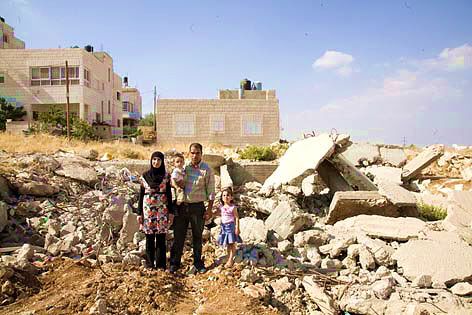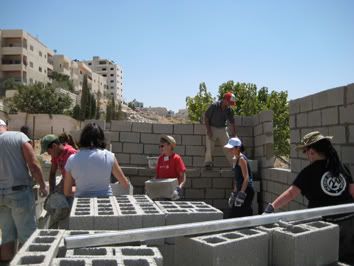
This report from the Israel Committee Against House Demolition (ICAHD) informs that considerable progress is being made in the effort to stop house demolition that is being conducted by Israel as a tool to ethnically cleanse more and more Palestinians from their homes and lands in the West Bank.
There are numerous organizations throughout the world participating in support of the Palestinian cause for justice and self-determination. But this is the first time a country has formally agreed to participate: Spain. Others, not perhaps the USA, will eventually join in as well, just as many countries cooperated to bring down the white supremacist South African Apartheid government in the 1990s.
Kudos for Spain: the first but not the last.
The Israel Committee Against House Demolition (ICAHD) reported today that the Spanish government will fund the rebuilding of a Palestinian home, brought down by American Caterpillar bulldozers as part of Israel’s continuing ethnic cleansing of the West Bank.
Today, July 15, ICAHD opened its 2008 summer rebuilding camp in Anata. The past five annual work camps have been funded by private donors, both organizations and individuals. This year, too, we have received generous support from several Quaker meetings in the UK, our ICAHD support groups in the US and UK and a large number of individuals. The truly amazing part of this year’s story is that the Spanish government is paying for the construction of an entire Palestinian home, plus the expenses of 18 members of Spanish NGOs who will join the camp. This is the first time a government has supported the rebuilding of an “illegal” Palestinian home demolished by the Israeli authorities in the Occupied Territories.
The home being built is that of the Elyyan family of Anata — Nadir, Fidaa and their two young children. The Elyyan’s are a young family who has never enjoyed a home of its own – their first and only home was demolished four years ago during its construction, leaving them to continue living in cramped quarters with Nadir’s parents and other siblings. We hope that over the next two weeks, with the help of more than 60(!) volunteers (18 from Spain, 22 internationals from Europe, North America and Latin America, plus Israelis and Palestinians), we will manage to build a home for the Elyaans. The involvement of the Spanish government only increases the chances that this will be so.
Because of the need – dozens of demolition orders have been issued against Anata families by the Israeli Ministry of Interior, Jerusalem Municipality and Civil Administration – we have decided to build a second home as well. This is the home of Hamis and Hitam Dahan and their eight children, an urgent case because their home was demolished just two weeks ago.
The rebuilding of Palestinian homes has always been a strong civil society statement of solidarity with the Palestinians as well as an effective means of highlighting the on-going Occupation, despite statements by Israeli officials over “sincere” hopes of “peace.” The addition of government support – the pointed and courageous support, political, financial and material of the Spanish government – means that our resistance is “trickling up” from the people into their governments. This is truly a hopeful harbinger of change.
ICAHD Building Camp 2008: Day 2
Summer Camp Participant
Wednesday, July 16, 2008This morning our team of international workers- Spanish, British, American, Italian, Dutch and Finnish-walked through the outskirts of Anata to our worksite. We are building a temporary home for a lovely family with seven children whose home was demolished a week ago. It was on this walk that I realized we are truly in a war zone. The rubble of demolished homes along the way makes it look as if the city has been bombed. And though no official war has been declared, the results are the same.
Shortly after we got to the site, several Israeli soldiers arrived carrying semi-automatic weapons. One of the soldiers questioned us about why we were there and cautioned us that we were not in Israeli territory. He said we did not understand the danger we were in. It was ironic, almost amusing, because the presence of these soldiers was the first danger any of us had felt. The Palestinians have greeted us with heartfelt warmth and gratitude. The legendary Arab hospitality is no myth. The children shout, “Welcome!” and ask us our names. A little boy gave me half of his candy bar as a gift. As we passed one house on our walk home, a woman we did not know emerged with a tray of drinks for us.
Later in the day, we took a walking tour of Anata and got first-hand look at how the aparthied system affects the citizens here. The wall that encloses the city effectively imprisons them. Many want to work but aren’t allowed to enter Jerusalem where there are jobs. The economy of this region is as devastated as the homes and the families who live here.
Basima, the woman whose home we are rebuilding, is living in a tin shack with her husband and several of her seven children. Some of the children are living with friends and relatives. Not only have these children lost their home, but at this traumatic time for their family, they are separated from their parents and each other. As the mother of four children myself, I can only imagine the depth of Basima’s heartbreak.
Thanks to ICAHD for permission to republish here.




Thanks for the diary, shergald. It’s encouraging to see that support for ICAHD’s good work is growing.
.
of Dutch seeds for Palestinian flower growers
Since his visit to Israel in May, foreign affairs minister Maxime Verhagen has repeatedly called on Israeli ministers, including defence minister Ehud Barak, to open the border.
Mr Verhagen underscored the political and socioeconomic significance of the Dutch flower project. `Since Hamas took control of Gaza, the economy has practically come to a standstill. It is important to offer the people of Gaza an alternative, the prospect of a better future, based on peaceful economic cooperation between Palestinians and Israelis.’
The project, which is worth one million euros, provides jobs for more than 1500 Palestinians. In the next few days, eleven trucks will deliver Dutch seeds to the growers in Gaza. The flowers – carnations – should be ready for sale round Christmas, Valentine’s Day and Easter.
"But I will not let myself be reduced to silence."Good to hear about this kind of thing starting to happen.
It makes me wonder whether Jimmy Carter’s outrage concerning the “human rights crime” going on in Gaza did not have a humanitarian effect on other world leaders.
One of the soldiers questioned us about why we were there and cautioned us that we were not in Israeli territory….
Which is precisely why the Israeli government should not be demolishing these homes in the first place. They’re not in Israel. They’re Palestinian homes on Palestinian land which the Israeli govt happens to have earmarked for Israeli settlement/annexation.
I wonder if that Israeli soldier ever asked himself why the Israeli govt is demolishing so many homes that he knows are not in Israeli territory?
Anyway, good news about Spain.
if they move ahead with this it will put lie to any argument that the israeli’s are even remotely interested in calming the unrest:
we’ll soon see if the israeli pm keeps his word: